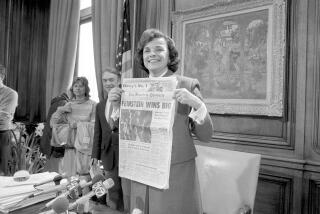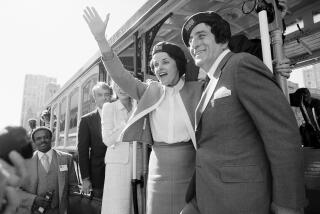When a longtime giver was about to give up
“I have a serious, painful and hopeless problem,” the letter from Sylvia Franklin began. “I’m in extreme need of a dentist.”
It’s routine in my line of work to hear from people who are sick, lonely, angry or afraid, especially in this economy. Although there’s not enough time in the day to take up every cause, some cries are impossible to ignore.
Franklin, who lives in Chatsworth, explained that she was retired on a fixed income, with medical insurance but no dental coverage. Several abscessed teeth had her in excruciating pain, and she had spent days trying to get help. The free clinics would have put her on a waiting list for weeks, and private dentists wanted an up-front payment she couldn’t handle.
It had gotten to where she was ready to give up.
“I’ve always been a positive person, a strong believer in life, but I must tell you, I’m rapidly losing that faith and am getting closer and closer to ending it all,” Franklin wrote. “If you know anyone, anyone, please help me. I don’t want to die. I’m 74 years old and except for the dental problem I’m in . . . pretty good shape.
“Please Mr. Lopez, please help me.”
When I dialed the number on the letter, a female voice answered.
“Mrs. Franklin?”
“Yes,” she said.
She was apologetic for having bothered me with her troubles and said she’d finally found a dentist who’d taken her in for practically nothing. Franklin, a retired market research specialist, told me her estranged husband died two years ago, leaving her mountains of debt she’d never known about.
He was Gary Franklin, a popular L.A. entertainment reporter and movie critic. Many years ago, in happier times, they’d lived well and raised two daughters in West Hills.
“I was up here, and now I’m down here,” she said, telling me it was hard to get used to asking for help. She had given up travel with friends and many other comforts. She was scratching by on Social Security and a portion of his pension, and dental insurance was either too expensive or covered very little.
This dentist really saved her, she said.
And who, I wondered, was the good Samaritan?
Dr. Kenneth Hirsch, Franklin told me. Friends of hers had recommended him.
And so I paid a visit to the Warner Victory Medical Center on Topanga Canyon Boulevard, where Hirsch told me he has been a dentist for 40 years.
“The job has been good to me and I’m giving back,” he said. “There’s nobody you can’t help.”
Hirsch is about to marry for the second time, and he said I’d already met his fiancee, a woman he described as “all soul.”
“Ellen Pfeifer,” he said. “Executive director of the Program for Torture Victims.”
I’d written about the nonprofit, which gives a second chance to battered refugees from all over the world.
“I’m their dentist,” Hirsch said. “People are beaten, their teeth knocked out. They stood up for democracy and somebody tortured them.”
Hirsch told me he has countless colleagues who do pro bono work. We were talking in a hallway, and he pointed to an office with the name Arnold R. Balber on the door.
“He started a free clinic in Watts,” Hirsch said.
Sure enough, Dr. Balber told me he began the Watts Christian Health Center a few years ago through World Impact, an inner-city ministry. He works there two Thursdays a month, and on the other two Thursdays, he mends teeth at the Ventura County Rescue Mission.
“We’re in a service profession,” Balber told me. “It’s not all about making money. And it’s great to see the smiles in Watts.”
Hard to believe there was so much goodwill in one building, but we weren’t done with our charity tour. Hirsch told me that after he treated Franklin, he referred her up to the fourth-floor office of James Jensvold, an oral surgeon who has done his share of volunteer dentistry at MEND in Pacoima. That stands for Meet Each Need with Dignity.
Jensvold, who on occasion has also treated animals at the Los Angeles Zoo, said he yanked four of Franklin’s teeth at “a greatly reduced rate.” She’s not his only patient who’s struggling, he said.
“Business is definitely down,” he went on, with lots of patients having lost dental insurance in workplace cutbacks.
Hirsch said patients never used to ask about the cost of a particular procedure. “Now everybody does. Even the celebrities that I have.”
When I left the medical building, I drove a few miles down the road to a modest apartment building and knocked on Franklin’s door. She greeted me with a sweet but shy smile, offering a quick peek at her dental work.
“I don’t want to sound like a whiner,” she said, leading me into a living room with lots of photos of her four grandchildren. “I’m a lot better off than a lot of people.”
She had a regular dentist, and coverage, for 25 years. But when she went to him a year or so ago with her problem, he said the work would cost her $400 a month.
“I walked out of that office and never went back,” Franklin said. She lived with the pain until she no longer could.
“I felt like I was at the end of the line. I was really, really quite empty at that point,” she said, explaining why she had written me the letter.
But did she really consider ending it all?
“Who knows what was in my mind then?” she said.
She wouldn’t have thought to ask her daughters for help, she said, especially because one is married to an accountant who just lost his job with a Texas oil company, and the other is in the computer business and living on the edge in the San Francisco Bay Area.
So she suffered quietly and mostly alone until she got lucky with Dr. Hirsch, and now she’s gratefully back to her old routine.
And what is that, exactly?
“I do some volunteer work,” she said, keeping with the theme.
Three or four days a week, she’s at the Jewish Home for the Aging, helping run their little store. It’s very gratifying to help those in need, she said. She also helps run a senior activities program at Pierce College.
We chatted for a while, and when I left, I was thinking about how disturbing it is that we live in a society in which a 74-year-old grandmother sits alone and afraid, feeling doomed because she can’t afford a dentist.
The city can be such a cold, isolating place, but here was a woman who gave and, in the end, received from kindred spirits. There was justice and redemption in that -- a measure of hope, too. I drove away feeling grateful that Sylvia Franklin had written me a letter.
--



